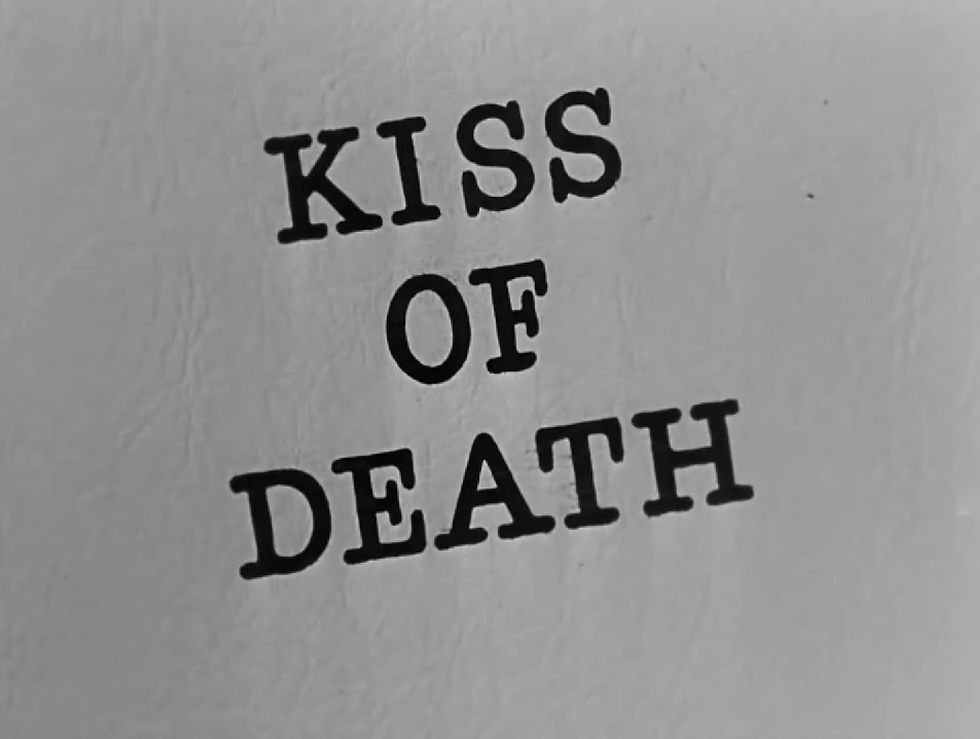
RODNEY BOWCOCK: Nick Bianco (Victor Mature) can’t seem to get a solid job after doing some prison time for a burglary, so he gets together with a few other guys for a string of robberies. Eventually, as tends to happen in these sorts of things, he gets busted. He takes the fall for the other guys and winds up going to Sing-Sing (literally) on a twenty-year rap. After his wife dies by suicide, and learning that his kids have been sent to an orphanage, he strikes a deal with an assistant DA (Brian Donlevy) to act as an informant on the outside so he can see his kids.
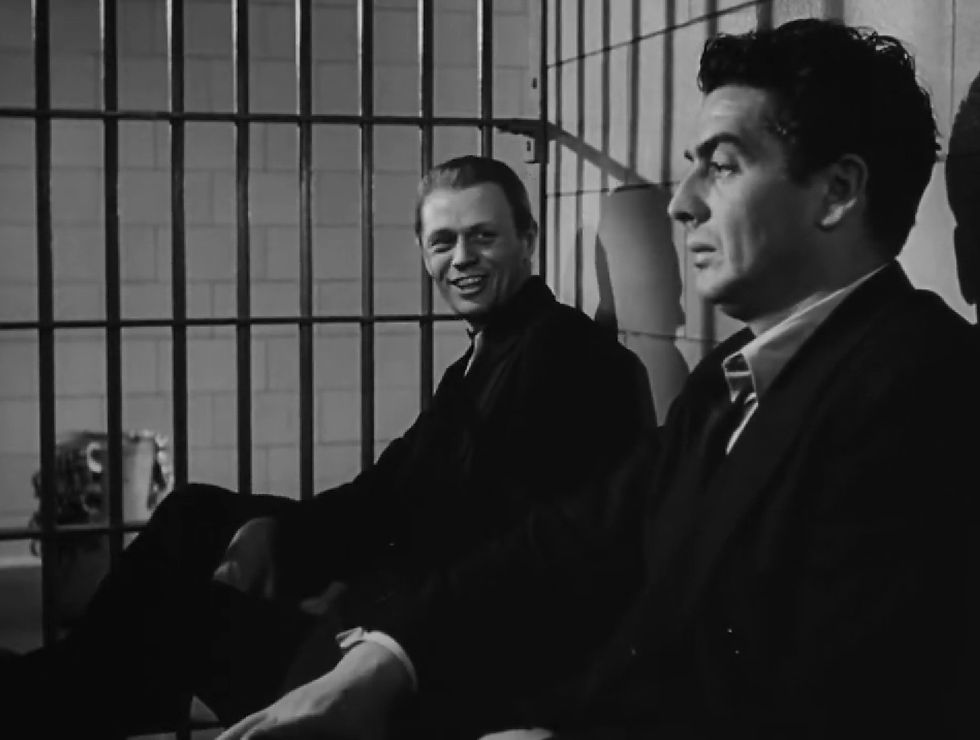
One of the guys that Nick has gotten himself mixed up with is a rough character, Tommy Udo (Richard Widmark), a true maniacal psychopath who tortures and kills with no thought or concern. Even after going on trial, Udo is found not guilty due to lack of evidence, and since Nick squealed, he has every right to be concerned and think that Udo has it out for him.
SAMANTHA GLASSER: The movie begins at Christmas and emphasizes that the holiday season isn't always a cheerful time, and that destitute ex-cons take matters into their own hands to get by. The story takes place over years, so this is a loose Christmas- movie to be sure, but that opening scene is memorable and triggers everything. What really struck me was that the men did the jewelry heist job with no masks, no gloves, and no worry about cameras in the hallway capturing them leaving the room. Kiss of Death takes place in a completely different world than our own.
RB: This isn’t a Christmas movie, but as you said, Christmas kind of kicks all of the action into high gear. This is a perfect example of the sort of film that our pal Michael Schlesinger referred to in his intro to White Christmas.
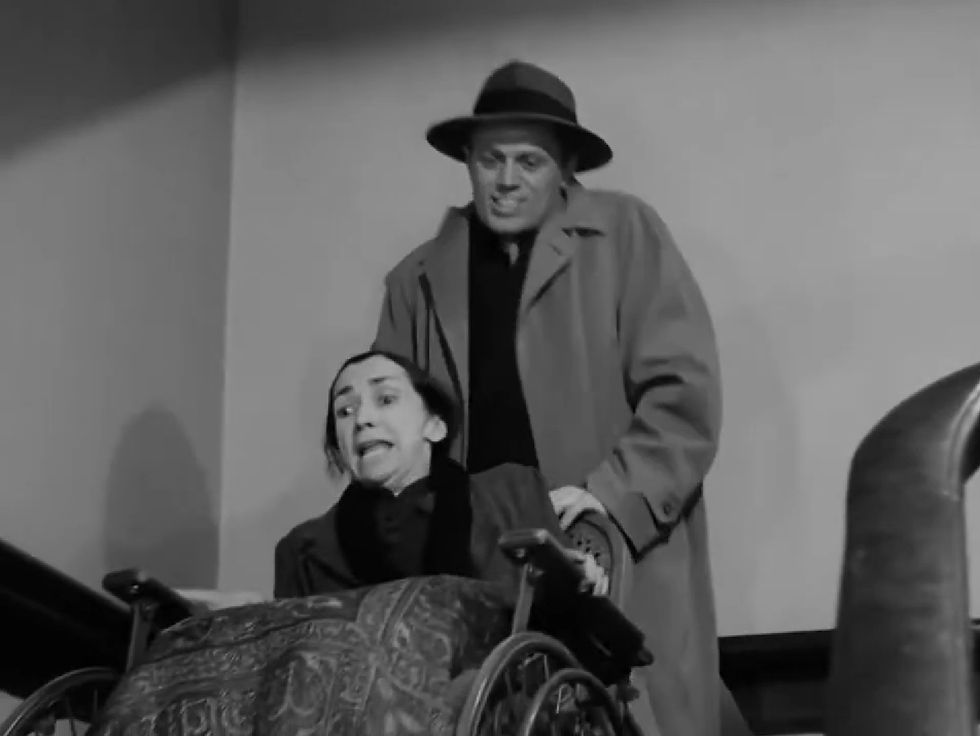
SG: There were quite a few articles published in movie magazines attempting to soften Richard Widmark's persona because of the heinous character he plays in Kiss of Death. They often showed photos of him at home with his toddler Ann and his wife Jean. The need for such publicity shows what an outstanding job he did portraying Udo, the deranged hitman who gets off on violence. He looks like a baby-faced Henry Aldrich, but it becomes obvious immediately that he is no schoolboy. The contrast works beautifully, and few will forget his hysterical giggle after seeing this movie. For those itching to see more, he played a similar character 23 years later in The Moonshine War.
RB: Widmark’s portrayal is without question the highlight of the film. There’s a good reason why this is still considered a landmark performance. It’s really something.
SG: "The guy actually made me mad, burned me to a crisp," Mature said of the final scene in the film. "We'd been over the dialogue a dozen times in rehearsal, but in the take, Dick changed from a quiet, friendly guy right in front of my eyes. He was Udo. He was crazy. He hated my guts, and for about three minutes I really hated his. I wanted to stand up and bust him right in the mouth, but I wasn't sure I could do it."
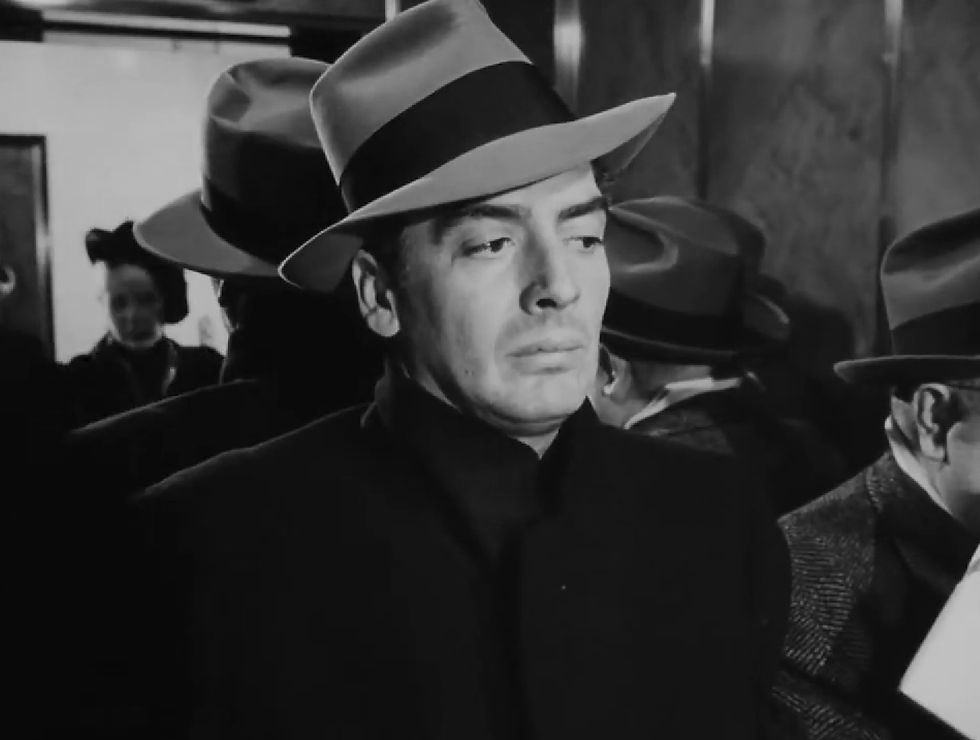
RB: It’s hard not to read this in the deadpan voice of Mature, and imagine his face, looking like he had just eaten a sour pickle as he says it, which speaks to my biggest issue with the film, but we’ll get to that more shortly.
SG: Prior to his debut on the big screen, Widmark had worked on Broadway and on radio where the laugh was created. (Could it have been on Molle Mystery Theatre's "Killer Come Back To Me" from 1946?) Although he was new to Hollywood, he had the strength and confidence to stand up to director Henry Hathaway when he snapped at him on set for talking too fast. Apparently, Hathaway didn't want Widmark on the film, and pushed instead for an authentic gangster for the part, but Darryl F. Zanuck overruled him. Widmark threatened to quit, but the director's assistant chased him down and convinced him to return. Shooting went more smoothly after that. His opinion changed over time, and actor and director would work together again several times including Down to the Sea in Ships, O. Henry's Full House, and Garden of Evil. Widmark was even a pallbearer at Hathaway's funeral.

RB: While on Broadway, Widmark did a lot of radio work, as wasn’t terribly unusual during the time. Canny listeners can spot him in many episodes of The Shadow, Columbia Workshop and others. It’s hard to say if the Molle episode that you mention is the origination of this characterization, or if it dates back to another, possibly lost, program.
SG: Contrast Widmark's portrayal of Udo with Mature's subdued, almost sleepy depiction of Nick Bianco. Like his heavy lids, the character seems to half-heartedly make his way through life, pre-maturely surrendering to the doom he sees so clearly on the horizon. Although he was promoted by the studio as a hunky man, I've never understood the appeal of Mature as a leading man. He is adequate in his portrayal but hardly exciting. According to IMDB, James Cagney was originally signed to play the lead role, which would have been electrifying and I wish that version existed.
RB: Mature does absolutely nothing for me and tends to spoil any film that he’s in with his lackluster depictions. I agree with you. Cagney would’ve been a lot of fun and his performance would’ve been a real change of pace for him.
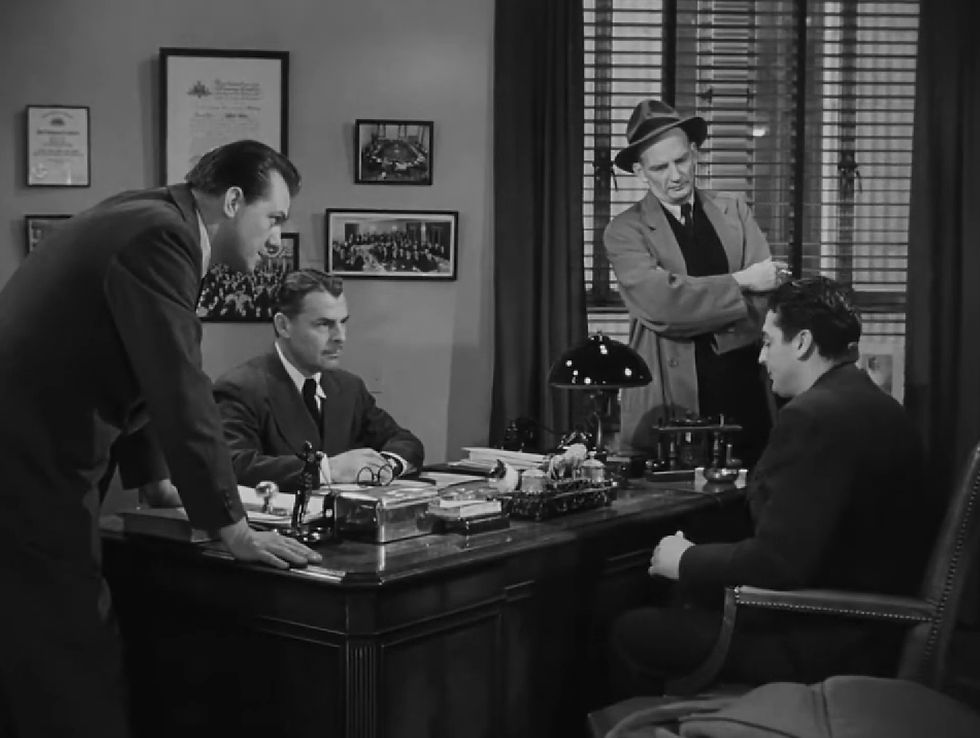
SG: Brian Donlevy is very good as the lead prosecutor who attempts to help Bianco in exchange for the information he gives on his gangster acquaintances. He makes the audience believe that he wants to help and follow through on his end of the bargain. Karl Malden is also noteworthy in an early part as a gung-ho sergeant. His character isn't likeable, but I defy you to dislike Malden after reading his memoir When Do I Start?
RB: This is good casting, and their appearances (along with Coleen Gray, who isn’t great, but it sympathetic and capable) along with Widmark’s incredible performance help to offset Mature’s droopy slogging through every scene.
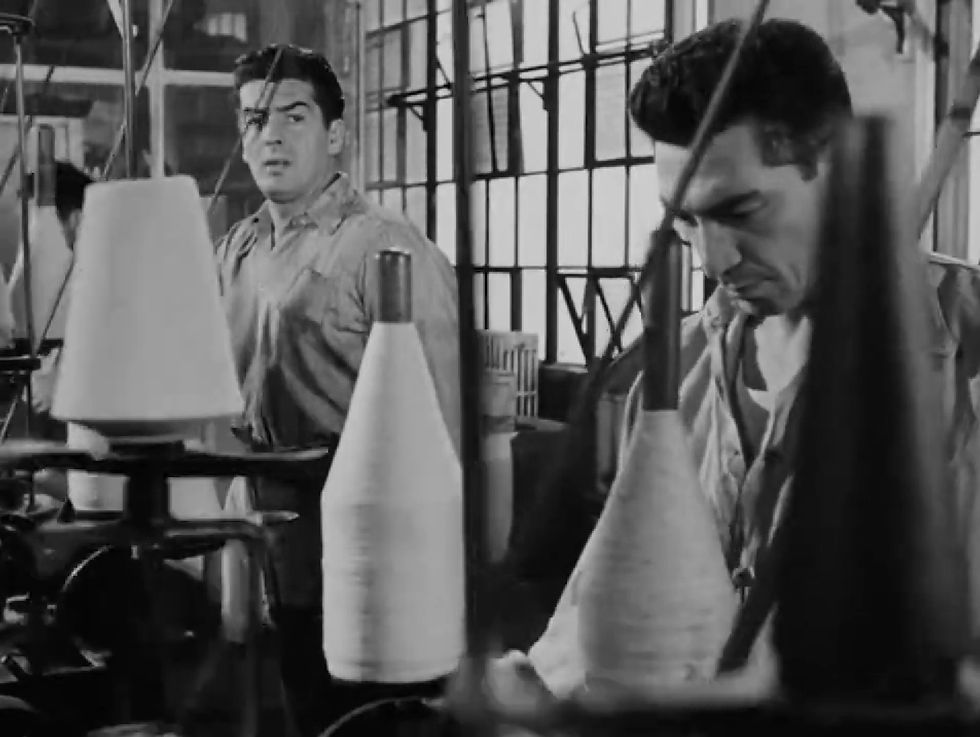
SG: The use of sound in Kiss of Death is notable. The silence in the elevator is intense as the gangsters ride down waiting to find out if they pulled off their job. The noise in the thread factory drowns out what is happening when Bianco tries to get a message about his wife in prison and we rely only on the actor's movements to understand the story. Later, there is a similar drowning-out effect from the train pulling away during the emotional departure. Silence is used skillfully again when Bianco sits alone in wait in his home as several men approach his door at night.
RB: Like you, I was impressed at the way silence was used to build and create mood. Henry Hathaway’s direction is really firing on all cylinders here, as this film falls in the midst of a series of Fox film noir films that he helmed. Some of these films, like The House on 92nd Street and The Dark Corner are probably better films than this one, but that’s not to say that there still aren’t many admirable things regarding direction and editing here.
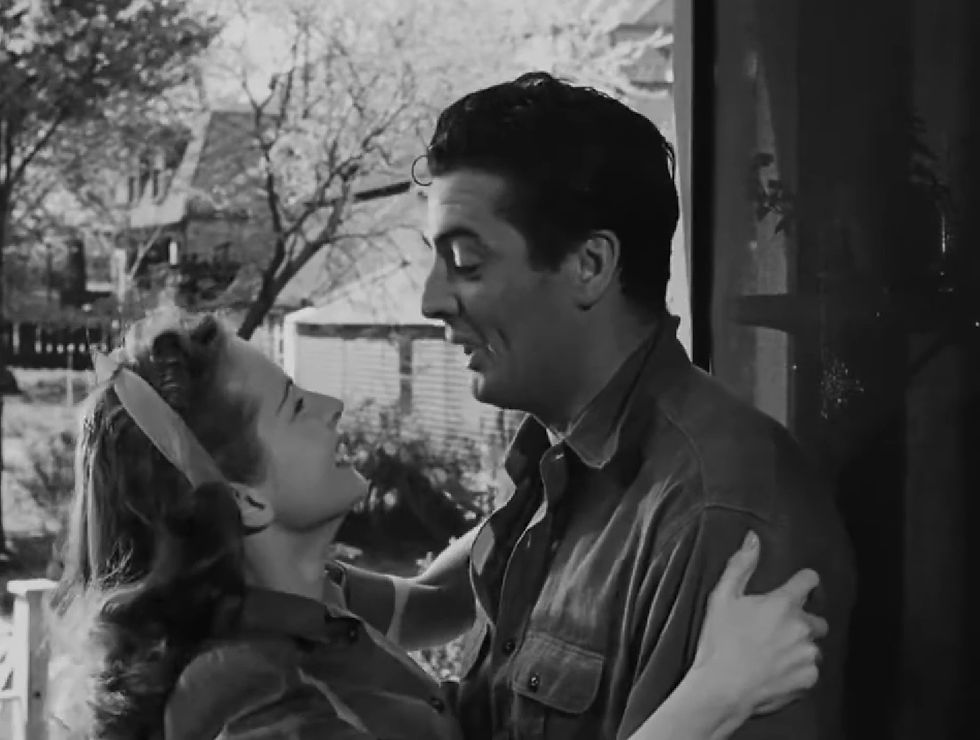
SG: The prison scenes were shot in The Tombs, the New York municipal jail. One day during shooting, a murderer was being transported from his cell when he turned on the guards with a razor blade in hand. One guard was slashed across the face and another was seriously injured but none of the movie crew was harmed.
RB: There was a real trend of shooting mystery and noir films on locations and it usually works. We saw The Tombs in Guilty Bystander at the Picture Show a couple of years ago.
SG: This movie was remade in 1995 with David Caruso and Nicholas Cage.
RB: I did not know that, and I will never see that movie.
SG: I don't have any intention to seek it out, but it is sometimes fun to compare remakes with the originals. I've seen three versions of The Women, maybe because I'm a glutton for punishment.
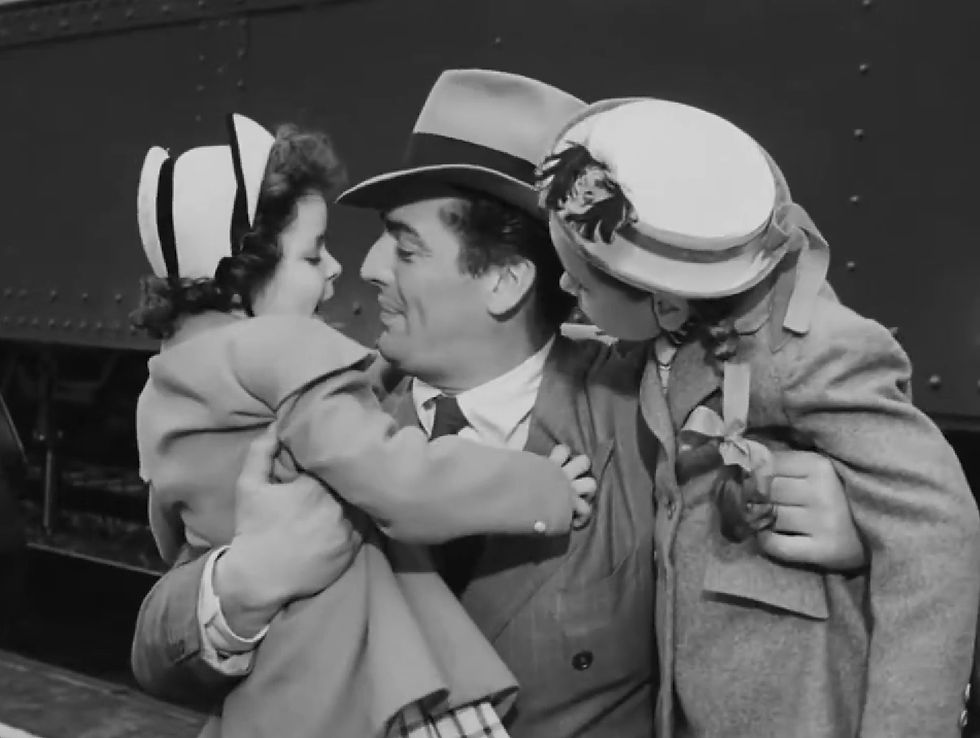
RB: Contrary to our views, some disagreed (obviously). The proprietor of the Community Theater in Leader Saskatchewan felt that “Mature is becoming an actor…for those crowds who want good drama this is their meat.” However, over in Ontario, Harland Rankin of the Plaza Theatre in Tilbury complained that “Victor Mature is no draw for us.” Ditto.
SG: There are a lot of great things about this movie, but my difficulty latching onto Mature's character weakened the viewing experience. Three stars.
RB: This could’ve and should’ve been a great movie. Mature takes it down, unfortunately. Three stars from me as well for a movie that I alternately found enthralling and dull.

Comments